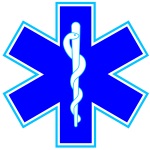Emergency Childbirth
From Protocopedia
Section 7 - PEDIATRIC / OBSTETRICAL
7.06 EMERGENCY CHILDBIRTH
PHASE I: LABOR
- Obtain history and determine if there is adequate time to transport:
- Inspect for bulging perineum, crowning or whether patient is involuntarily pushing with contractions.
- If contractions are two minutes apart or less, or any of the above are present, prepare for delivery.
DO NOT ATTEMPT TO RESTRAIN OR DELAY DELIVERY UNLESS PROLAPSED CORD.
- If mother is hyperventilating, encourage eye contact and coach her to take slow, deep breaths.
- If mother becomes hypotensive or lightheaded at any time, Fluid boluses in increments of 200 - 300 ml, to titrate systolic BP > 90 mm Hg and apply OXYGEN @ 100% via NRB mask or assist with BVM.
- Position mother supine, slightly turned to left side on flat surface if possible. If time permits, put on full blood and body secretion barriers.
- Open OB pack. Place drapes over mother's abdomen and beneath perineum. Prepare bulb syringe, cord clamps and chux to receive infant.
PHASE II: DELIVERY
- Allow head to deliver passively. Control rate of delivery by placing palm of one hand gently over occiput. Protect perineum with pressure from other hand.
- Gently suction infant's nose and mouth as soon as the head delivers if time allows.
- Once the head is delivered, allow it to passively turn to one side. This is necessary for the shoulders to deliver.
- Feel around the infant's neck for the umbilical cord, (nuchal cord). If present, attempt to gently lift it over the baby's head. If unsuccessful, double clamp and cut the cord between the clamps.
- To facilitate delivery of the upper shoulder, gently guide the head downwards.
- Support and lift the head and neck slightly to deliver the lower shoulder.
- The rest of the infant should deliver quickly with one contraction. Firmly grasp the infant as it emerges. The baby will be wet and slippery.
Keep newborn level with perineum until the cord stops pulsating and is double clamped.
Proceed to NEWBORN (7.08) and POST-PARTUM CARE PRACTICE PARAMETER (7.09).
If able, mother may hold infant on chest / abdomen during transport.
Appropriate Obstetric Receiving Facilities
- Florida Hospital Altamonte (Seminole)
- Oviedo Medical Center (Seminole)
- Winnie Palmer Hospital (Orange) Call ORMC and transport at their directive
- Florida Hospital Orlando (Orange)
- Winter Park Memorial (Orange)
